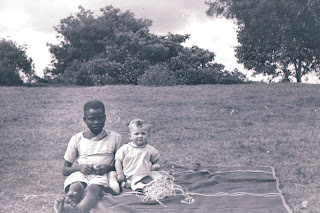My first visit to the rural city of Coxim in Mato Grosso do Sul in Western Brazil confirmed every negative opinion I had heard about this place.
Close by, the expansive Pantanal spreads all the way to the Paraguay River. The Pantanal is one of the largest swampy places in the world. I had heard about the flies zooming down around the food in Coxim, but not the other challenges I would meet.
Once a flourishing church with a private Baptist school, the church had fallen headlong into a miserable state. The school closed following the abrupt departure of most church members from worship services. The three-hour direct bus service from Campo Grande to Coxim was extended an extra hour, or more if it was a "pinga-pinga" service. Pinga was a kind of beer. Pinga-pinga meant the bus stopped at each and any dirt entrance to the fazendas. Cattle raising is the chief occupation there. An extra hour was well worth the investment of time if you wanted to meet rural people in the northern part of the state.
A new military man had come as a trainer of army recruits, and he asked me to be there at 2:00 pm sharp at the military base. I had never spoken to a room full of 60 new recruits. The topic given to me was unique: "Christian Beliefs!" The memory of dozens of flies circling the rice and beans on my lunch plate quickly left as I spoke to those young men. If I made dozens of mistakes in Portuguese, they didn't show it in facial gestures. Amos, the wonderful Black Brazilian, also had me go on the radio each time I went. He carried on the 15 minutes, daily programs. What happened there next was mostly because of him.
The church services had been canceled, so I simply visited every home I could find that was associated with Coxim Baptist Church.
Two weeks later, I arrived early on Saturday morning and went to visit one of the two elderly women still faithful to the Lord in that congregation. She lived in a spread-out, beautifully decorated, ranch-style house with gorgeous flowering plants inside and outside. I prayed with her and asked about her ten children, unable to fix each name with the current family status, numerous grandchildren, and where they all lived.
Leaving her home, I almost bumped into a man about my age. The entranceway into her home was kind of dark since flowering shrubs grew all around. "Are you walking in the light?" were the words I uttered. I left, confused as to the reason those words came out when I was kind of making a joke with someone I had never met.
That weekend, we had a prayer meeting instead of a worship service. But six weeks after I first arrived,
I was met with a request to open the doors of the church building. Coxim gets sweltering hot temperatures on a regular basis, and this was the middle of Brazilian summer. Every window was wide open to catch a bit of the breeze. And there, sitting with his mother, was the man I encountered two weeks before.
"I had a vision the night before I visited my mother," he said after the service. "I heard strange words, 'Are you walking in the light?' and I saw someone like you at my mother's home. Distressed, I went there as soon as I could because I didn't want a foreigner coming to our family home." He went on to say, "I repented of my sins, which are many, and I want to see this church flourishing again."
Many such stories happened in the following three months. I spent much time visiting homes. Each Sunday evening, I barely made it to the bus station, usually as the bus was already backing away from the platform. And since it was a "pinga-pinga," letting men off as they went back for the Monday rounds on horseback, I usually arrived at our home in Campo Grande about 1:00 am. I left aside the petty differences that had coalesced into internal divisions. The beauty of the Lord Jesus Christ took over.
Three months later, I led a baptism with 21 young people confessing their faith in the Coxim River. Two months after that, we witnessed a powerful moment with people confessing their bad feelings and bad words to each other. Seven months after I first visited, we had a graduate from the Seminary in Rio de Janeiro come to assume the pastorate. That service saw benches lined up outside the building, all the way to the street with over 300 in attendance.
Reconciliation had taken place in an amazing way. The Spirit of the Lord had come upon us. Those humble believers, many with less than nine years of schooling, were willing to put away their differences. An "almost-failed" church came back to life in the most amazing way.
Oh! I don't dwell on flies and piranha fish when I remember Coxim these days. It's something else, something heavenly. "I appeal to you, brothers, in the name of our Lord Jesus Christ, that all of you agree with one another so that there may be no divisions among you and that you may be perfectly united in mind and thought." I Corinthians 1:10.
.tif)
















